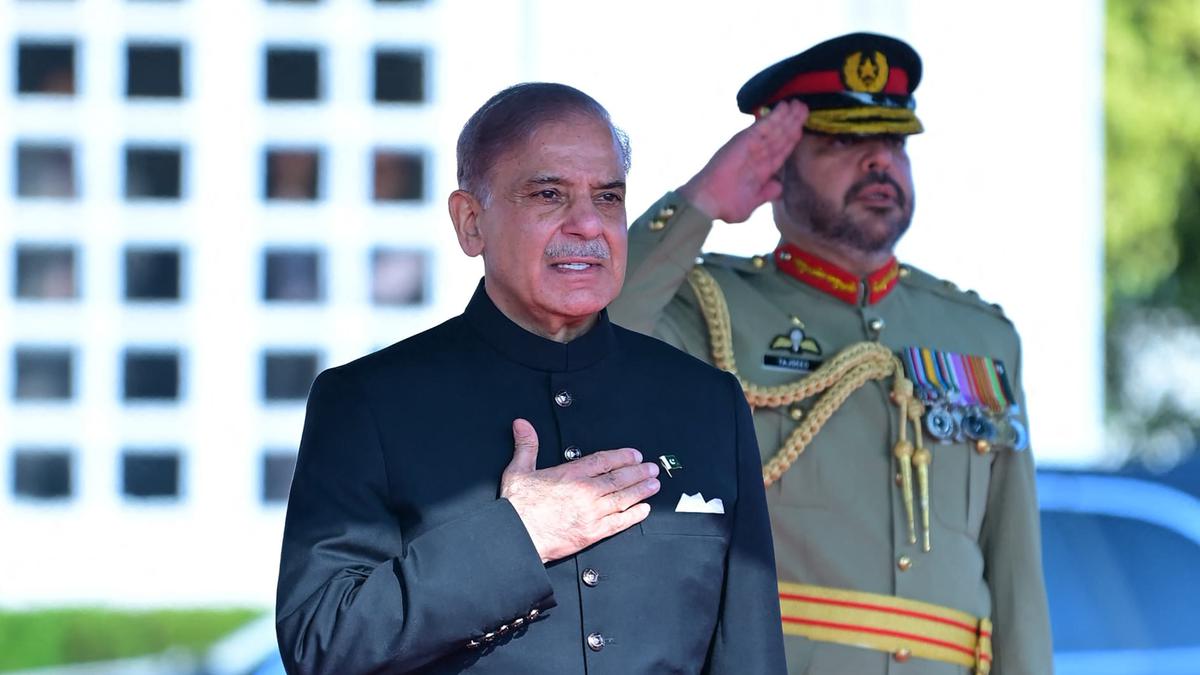
The military’s continuing hold over Pakistan Premium
The Hindu
Pakistan's election drama ends with Shehbaz Sharif as Prime Minister, raising concerns about military interference and political instability.
After much waiting, Pakistan’s election drama appears to be over, with Shehbaz Sharif becoming the Prime Minister for the second time after his Pakistan Muslim League-Nawaz (PML-N) joined hands with the Pakistan Peoples Party (PPP) to form a coalition government. The two parties may claim that they have taken this step to save Pakistan from instability; however, in reality, this is only poised to exacerbate the economic and political chaos. In the days ahead, the new government will have its task cut out to alleviate Pakistan’s troubles while also pandering to the military’s whims and fancies.
In Pakistan, it is a known secret that the military establishment interferes in the electoral process and selects the laadla (a derogatory term for the army-backed prime ministerial candidate). However, the brazenness with which the electoral manipulation has occurred this time has caused widespread anger among people against the army leadership. Allegations of rigging notwithstanding, the military appears to have achieved its intended objectives without caring much about the people’s mandate. This is bound to have implications for not just domestic political stability but also for South Asia.
Pakistan’s history is replete with instances of direct or indirect military interference in domestic politics, including four periods of martial law. This time, the independent candidates backed by Imran Khan’s Pakistan Tehreek-i-Insaf (PTI) won the highest number of National Assembly seats. In 2018, Mr. Khan himself became the Prime Minister of Pakistan with the tacit support of the army. So, it is somewhat ironic that his party is now raising such a hue and cry about the rigging of the elections.
The last purportedly free and fair polls in Pakistan were held in 1970. However, the disastrous consequences of those elections still linger in the memory of the military establishment. Despite securing an absolute majority in erstwhile East Bengal, Sheikh Mujibur Rahman’s Awami League was not allowed to form the government in Islamabad. This spawned a public outcry and eventually caused the breakup of Pakistan in 1971. Since then, the army has been largely successful in manipulating the electoral mandate and selecting prime ministers. Both domestic and international pressures have so far failed to stop the army from interfering in domestic politics.
Also Read | Imran Khan demands high treason proceedings against Pak poll mandate thieves
The latest arrangement of selecting the prime minister also squarely benefits the military establishment. First, with Mr. Shehbaz Sharif as the ‘selected’ Prime Minister, it will be easier for the army to control the civilian government. Unlike his elder brother, Nawaz Sharif, Mr. Shehbaz Sharif will not rebel against the military and will likely remain a trusted yes-man in the foreseeable future. Second, he shares good ties with important Western countries, in addition to China and Saudi Arabia. So, though the army is criticised by some countries for interfering in the elections, it will still receive some international support for at least holding general elections and helping form a (token) civilian government. The Chief of Army Staff (COAS), General Syed Asim Munir, is aware that the success of the Special Investment Facilitation Council, his pet project to stabilise the country’s economy, depends on external financial support. For that to happen, any ‘selected’ government in Islamabad is sufficient to move things forward.
Third, a fractured electoral mandate with no clear majority for any political party has given enough manoeuvring space to the army to put PML-N and PPP in a politically weak coalition. Considering the sad fate of previous governments in Pakistan, this new PML-N-PPP coalition is unlikely to last its five-year term. More importantly, this fractured mandate has already started an ugly power struggle among various parties. This political wrangling will help divert attention from the wrongdoings of the military establishment and put the spotlight on the political class and civilian institutions. Finally, with a ‘selected’ and weak prime minister in office, General Munir may now plan to seek an extension in November 2025. It is noteworthy that these were the first National Assembly polls under his tenure as the COAS. His responsibility was to ensure a free and fair election in a politically polarised Pakistan — a task at which he failed miserably.

Capt. Brijesh Chowta, Dakshina Kannada MP, on Saturday urged Union Finance Minister Nirmala Sitharaman to facilitate speeding up of ongoing critical infrastructure works in the region, including Mangaluru-Bengaluru NH 75 widening, establishment of Indian Coast Guard Academy, and merger of Konkan Railway Corporation with the Indian Railways.

Udhayanidhi Stalin urges cadres to launch campaign for securing 200 seats in 2026 Assembly elections
Udhayanidhi Stalin urges DMK members to gear up for 2026 Tamil Nadu elections, aiming for 200 seats.









